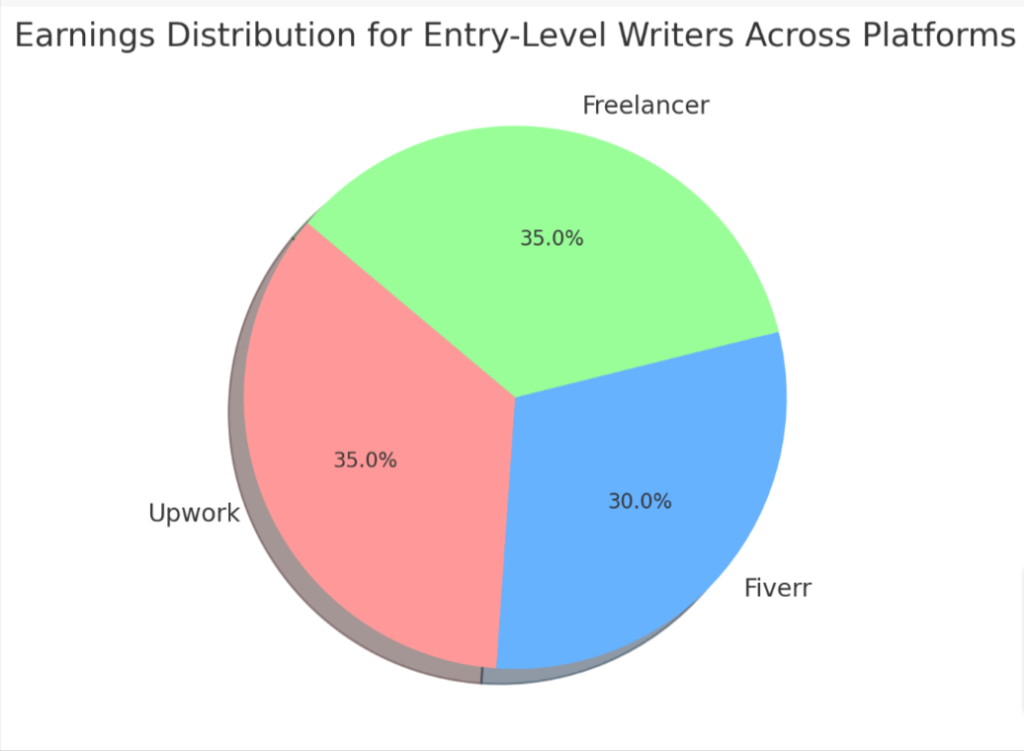Decoding the Pay Scale: The Real Income from Online Writing
Introduction
In today’s digital era, the allure of working from anywhere, setting one’s own hours, and having a potentially unlimited income has made online writing a popular career choice. Whether you’re an established writer curious about the online realm, a budding freelancer seeking your first gig, or someone considering a career shift, you’ve likely pondered: how much can you really earn with online writing jobs?
The online writing landscape is as vast as it is varied. From crafting punchy ad copy to penning comprehensive technical manuals, online writing caters to a myriad of niches and expertise levels. But, with this abundance of opportunities comes a deluge of questions, myths, and misconceptions.
This article seeks to demystify the earning potential of online writing, presenting a comprehensive overview of the industry, factors that influence earnings, real-life examples, and strategies to maximize one’s income.
Embark on this exploration to understand not just the numbers but also the stories behind them, providing a realistic and practical perspective on the world of online writing. Whether your aim is to achieve financial independence, fuel a passion, or simply learn about the industry, this guide serves as a roadmap to the potential earnings in the vast universe of online writing.
The Different Types of Online Writing Jobs
The world of online writing is incredibly diverse, with numerous avenues and niches to explore. Understanding these can not only help set realistic earning expectations but also aid in finding a niche that resonates with one’s passion and skills. Let’s delve into the most prominent types of online writing jobs.
Freelance Writing
Freelance writing encompasses a broad spectrum of tasks, from short blog posts and articles to long-form content and feature stories. As a freelancer:
- What is it? Freelancers are self-employed individuals who offer their writing services to clients on a project-by-project basis. They have the freedom to pick and choose their projects, clients, and even their working hours.
- Platforms for Freelancers: Numerous online platforms like Upwork, Freelancer, and Fiverr have emerged as popular marketplaces. These platforms connect freelance writers with clients seeking their services. While they offer vast opportunities, they also come with challenges like competition and service fees.
- Typical tasks and assignments: Freelancers might find themselves writing blog posts, product descriptions, reviews, or even e-books. The diversity in tasks ensures that there’s rarely a dull moment in a freelancer’s life.
Blogging
Blogging has evolved from being just a hobby to a lucrative profession for many.
- Setting up a personal blog vs. writing for others: While some bloggers prefer to set up their own platforms, curating content based on their passions and interests, others collaborate with existing blogs as contributors or guest writers.
- Monetization strategies: Successful bloggers harness multiple revenue streams. From affiliate marketing, where they earn a commission for products sold through their referrals, to sponsored posts and display ads, the monetization potential is vast. Consistency, quality, and a defined target audience are key to successful blogging.

Copywriting
Copywriters are the wordsmiths behind persuasive and engaging content that drives action.
- Difference between copywriting and content writing: While content writing aims to inform, entertain, or educate readers, copywriting is designed to get the reader to take a specific action – be it making a purchase, signing up for a newsletter, or any other targeted outcome.
- Sectors in demand: With the boom in e-commerce, there’s a growing demand for copywriters in product descriptions, sales pages, and email marketing campaigns. Their knack for creating compelling content makes them invaluable in the sales and marketing sector.
Technical Writing
For those with a flair for detail and the ability to break down complex information:
- Specialized knowledge requirements: Technical writers specialize in creating content like user manuals, how-to guides, and product specifications. This often requires a deep understanding or background in specific industries or technologies.
- Industries in demand: IT, healthcare, and engineering are among the top industries seeking skilled technical writers. As technologies evolve, so does the demand for professionals who can effectively communicate their intricacies.
Ghostwriting
Often the unsung heroes behind many popular articles and books:
- Writing anonymously for someone else: Ghostwriters produce content that is credited to another person, usually for a fee. They remain anonymous, allowing the credited author to shine.
- Book ghostwriting vs. article/blog ghostwriting: While some ghostwriters craft entire books for notable personalities or authors, others produce shorter content like articles or blogs. Their versatility and adaptability are key in this behind-the-scenes role.
Each of these writing avenues comes with its own set of challenges, rewards, and earning potentials. Finding the right fit is crucial not just for financial success but also for long-term job satisfaction.
Actual Earnings: Numbers and Real-Life Examples
While hypothetical scenarios provide a foundation, concrete numbers and real-world testimonials bring clarity. Here, we’ll delve into what writers at different experience levels are genuinely earning, supplemented with real-life examples to paint a clearer picture.
Entry-Level Writers
Newbies in the writing industry often face challenges in securing high-paying gigs, but everyone has to start somewhere.
- Average earnings for beginners: Entry-level writers can expect to earn anywhere from $10 to $50 per article on platforms like Upwork or Fiverr. However, this can vary based on the length and complexity of the content.
- Testimonials and real-life experiences: Jane, a newbie writer from Canada, shares, “When I started on Freelancer, I earned around $15 for a 500-word article. It wasn’t much, but it helped me build my portfolio.”
Intermediate-Level Writers
With a solid portfolio and some experience under the belt, writers can command better rates.
- Income ranges and what sets them apart from beginners: Intermediate writers, with a year or two of experience, can often charge between $50 to $200 per piece, depending on the niche and client. They usually have a specialty, a more extensive portfolio, and perhaps some client testimonials that vouch for their expertise.
- Success stories: Raj, a tech writer from India with two years of experience, mentions, “After writing for various tech blogs and creating a niche for myself, I now comfortably charge $150 for a detailed review or article. My expertise in the tech field gives me an edge.”
Expert-Level Writers
The creme de la creme of the writing world, expert writers have not only honed their craft but also built valuable networks over the years.
- Potential earnings at the top tier: Expert writers, with many years of experience and specialization, can earn anywhere from $500 to over $2000 for longer pieces, especially if they are in high-demand niches. Some even charge hourly rates, which can range from $50 to $200 or more.
- Case studies of top earners in the industry: Laura, a seasoned health and wellness writer from the UK, says, “I’ve been in the industry for over a decade. My deep connections, extensive portfolio, and specialization in holistic health allow me to charge premium rates. For a detailed guide or e-book, my fees start at $1000.”
It’s vital to remember that these figures are averages and can vary based on several factors discussed earlier. However, they offer a realistic snapshot of what writers can expect at various stages of their careers. With persistence, continuous learning, and strategic positioning, climbing the earning ladder is an achievable feat for any dedicated writer.
Strategies to Maximize Earnings in Online Writing
While raw talent and dedication are essential ingredients for a successful online writing career, they often need to be supplemented with strategic actions. Here are some tested strategies that can help writers amplify their earnings over time.
Invest in Continuous Learning
The writing industry is dynamic, and staying updated can set you apart.
- Courses and certifications: Enrolling in writing courses or obtaining certifications can refine your skills and make you more attractive to potential clients. Platforms like Coursera, Udemy, and LinkedIn Learning offer a plethora of courses tailored for writers.
- Reading widely: The best writers are voracious readers. Consuming content from diverse sources, genres, and styles can subconsciously improve your writing and offer fresh perspectives.

Specialize in a Lucrative Niche
Generalists may have a broad range, but specialists often command higher fees.
- Identifying high-demand niches: Some niches, like technology, finance, and medical writing, generally pay more because of their specialized nature. Researching and identifying these can be the first step towards higher earnings.
- Building expertise: Once you identify a niche, delve deep. Attend relevant seminars, take specific courses, and network with industry professionals to establish authority.
Build a Strong Online Presence
In the digital age, visibility can significantly influence income.
- Personal website or blog: Having a dedicated space where clients can view your portfolio, read testimonials, and contact you directly can make a huge difference. Ensure that your website is professional, easy to navigate, and showcases your best work.
- Active on social media: Engage with fellow writers, clients, and industry influencers on platforms like LinkedIn, Twitter, and Medium. Share your work, participate in discussions, and stay updated with industry trends.
Diversify Income Streams
Relying solely on one income stream can be risky. Diversification can provide stability.
- Exploring affiliate marketing or blogging: If you have a blog or website, consider leveraging affiliate marketing. Writing reviews or recommendations can earn commissions on sales made through your referral links.
- Offering related services: Branch out by offering related services like editing, proofreading, or content strategy consultations. These can add additional revenue sources and make you a one-stop solution for many clients.
Foster Client Relationships
Building and maintaining strong relationships can lead to consistent work and referrals.
- Clear communication: Ensure you understand client requirements thoroughly, set clear expectations, and maintain open channels for feedback. This builds trust and can lead to long-term collaborations.
- Ask for testimonials and referrals: Positive testimonials can boost your credibility. Don’t hesitate to request satisfied clients for testimonials or referrals. Word of mouth remains a potent tool in the writing world.
Incorporating these strategies can not only boost your immediate earnings but set you up for long-term success. It’s essential to remember that the journey of a writer is marred with rejections, revisions, and challenges. Yet, with resilience, adaptability, and the right strategies, the potential for growth and earnings is boundless.
Pitfalls to Avoid in the Pursuit of Higher Earnings
While the journey towards maximizing earnings in online writing is filled with opportunities, it’s equally fraught with pitfalls. Being aware of these common traps can save you time, protect your reputation, and ensure sustained income growth.
Undervaluing Your Work
It’s easy for writers, especially beginners, to sell themselves short.
- Avoid accepting extremely low rates: While starting with lower rates is common, persistently working for peanuts can undervalue your skills and demotivate you. Know your worth and periodically reassess your rates.
- Avoid excessive free work: While occasional pro-bono work or samples can be beneficial, consistently working for free with the promise of exposure can be detrimental. Exposure doesn’t pay the bills!
Overcommitting
Taking on more than you can handle can compromise quality.
- Learn to say ‘no’: While turning down work might seem counterproductive, spreading yourself too thin can lead to burnout and sub-par work. Prioritize tasks and set realistic deadlines.
- Manage time effectively: Utilize time management tools and techniques to ensure you don’t bite off more than you can chew.
Ignoring Contracts and Agreements
Protecting yourself legally is crucial in the freelance world.
- Always have a written agreement: Before starting any project, ensure there’s a clear contract outlining payment terms, scope of work, and other essential details.
- Beware of scams: Unfortunately, the online world is riddled with clients who might refuse to pay after work submission. Always research clients, ask for upfront payments, or use trusted platforms that offer payment protection.
Neglecting Continuous Improvement
Complacency can be a silent career killer.
- Stay updated with industry trends: Writing styles, client preferences, and industry demands evolve. Regularly update your skills to stay relevant.
- Seek feedback: Constructive criticism can be invaluable. Encourage clients and peers to provide feedback, and be open to making necessary improvements.

Failing to Diversify
Depending solely on a single client or platform is risky.
- Explore multiple platforms: Instead of relying solely on one platform like Upwork or Fiverr, diversify your client acquisition sources. This reduces the risk of income loss if one stream dries up.
- Build a personal brand: Instead of solely relying on platforms, invest in building your personal brand, which can attract clients directly, ensuring more stability.
Avoiding these pitfalls doesn’t guarantee instant success, but it does ensure a smoother journey towards achieving your income goals in online writing. The road might be winding and filled with obstacles, but with awareness, resilience, and continuous growth, success is not just possible—it’s probable.

The Future of Online Writing Jobs
The digital era continues to evolve, and with it, the landscape of online writing. Understanding where the industry is headed can provide writers with a competitive edge, enabling them to adapt and thrive.
The Rise of Multimedia Content
While written content remains central, there’s an undeniable shift towards multimedia integration.
- Incorporation of visuals: Articles enriched with relevant images, infographics, and videos are more engaging and shareable, increasing their value and reach.
- Skill diversification: Writers who can script video content or create engaging infographics will be in higher demand. Acquiring or collaborating with experts in these areas can enhance content quality and earnings.
Voice Search and Conversational Writing
With the proliferation of smart speakers and voice assistants, the way content is optimized is changing.
- Adapting to natural language queries: Writing in a more conversational tone, anticipating voice search queries, and understanding the nuances of spoken language search can position writers at the forefront of this trend.
AI and Automated Writing
Artificial intelligence is making inroads into the content creation domain.
- Understanding AI’s role: While tools like GPT-4 can generate content, there’s a human touch, creativity, and understanding they can’t replicate. Instead of fearing AI, writers should use it to streamline tasks and focus on adding unique value.
- Staying irreplaceable: Focusing on opinion pieces, in-depth analysis, and emotional storytelling can keep writers relevant in an increasingly automated world.
Greater Emphasis on Authenticity and Originality
In an age of information overload, authenticity stands out.
- Prioritizing original research: Articles backed by original studies, interviews, or firsthand experiences can command higher rates due to their unique value.
- Building a personal voice: Readers connect with genuine voices. Developing a distinct style and voice can set a writer apart in a crowded digital space.
Expansion of Self-Publishing and Indie Platforms
The gatekeepers of publishing are changing, offering more opportunities for writers.
- Exploring self-publishing: Platforms like Kindle Direct Publishing or Gumroad allow writers to self-publish books, guides, or courses, opening new revenue streams.
- Leveraging indie platforms: Websites like Substack or Medium’s Partner Program allow writers to earn directly from readers, bypassing traditional ad-based models.
The future of online writing is not just about adapting to changes but proactively shaping them. By staying informed, continuously upskilling, and embracing innovation, writers can ensure they remain relevant, in-demand, and ahead of the curve in an ever-evolving digital landscape.
Final Thoughts and Encouragement for Aspiring Writers
Embarking on a journey in online writing is both an exciting and daunting endeavor. The landscape is vast, filled with opportunities, challenges, and the promise of personal and financial growth. As we wrap up our exploration, let’s leave aspiring writers with some encouragement and key takeaways.
Believe in Your Unique Voice
Every writer brings a distinctive voice, perspective, and experience to the table.
- Your story matters: In a digital space crowded with content, it’s your unique experiences and viewpoints that will set you apart. Cherish and nurture your voice.
- Avoid comparison: It’s easy to feel overshadowed by seasoned writers or viral pieces. Remember, every writer started somewhere. Focus on your journey and growth.
Be Patient and Persistent
Success in online writing rarely happens overnight.
- Embrace rejection: Even the best writers face rejection. Instead of being disheartened, use it as a learning opportunity. Analyze feedback, refine your craft, and persevere.
- Celebrate small wins: Whether it’s a published article, a positive comment, or reaching a personal writing milestone, celebrate every success. These moments build momentum and confidence.
Continuously Evolve and Adapt
The digital world is in perpetual flux, and adaptability is key.
- Stay curious: Embrace changes in the industry, experiment with new formats, and always be on the lookout for learning opportunities.
- Network and collaborate: Engage with fellow writers, join writing groups, and collaborate on projects. These connections can provide support, open doors to opportunities, and enrich your writing journey.
Prioritize Self-Care
Writing, especially when pursued passionately, can be mentally taxing.
- Balance work and rest: Ensure you take regular breaks, engage in hobbies, and give yourself time to recharge. A rested mind is more creative and productive.
- Set boundaries: While the allure of earning more can be tempting, understand your limits. Avoid burnout by setting realistic expectations and boundaries with clients.
Remember Why You Started
In the hustle of meeting deadlines and chasing earnings, it’s easy to lose sight of the passion that ignited your writing journey.
- Reconnect with your ‘why’: Whether it’s the love for storytelling, the desire to educate, or simply the joy of crafting words, periodically revisit your motivations.
- Journal your journey: Documenting your experiences, milestones, and challenges can serve as a reflective tool and a source of inspiration during tough times.
In conclusion, the realm of online writing is vast, vibrant, and brimming with potential. With the right tools, mindset, and resilience, any aspiring writer can carve a niche for themselves. The road might have its bumps, but the destination—be it personal fulfillment, financial success, or both—is well worth the journey.

